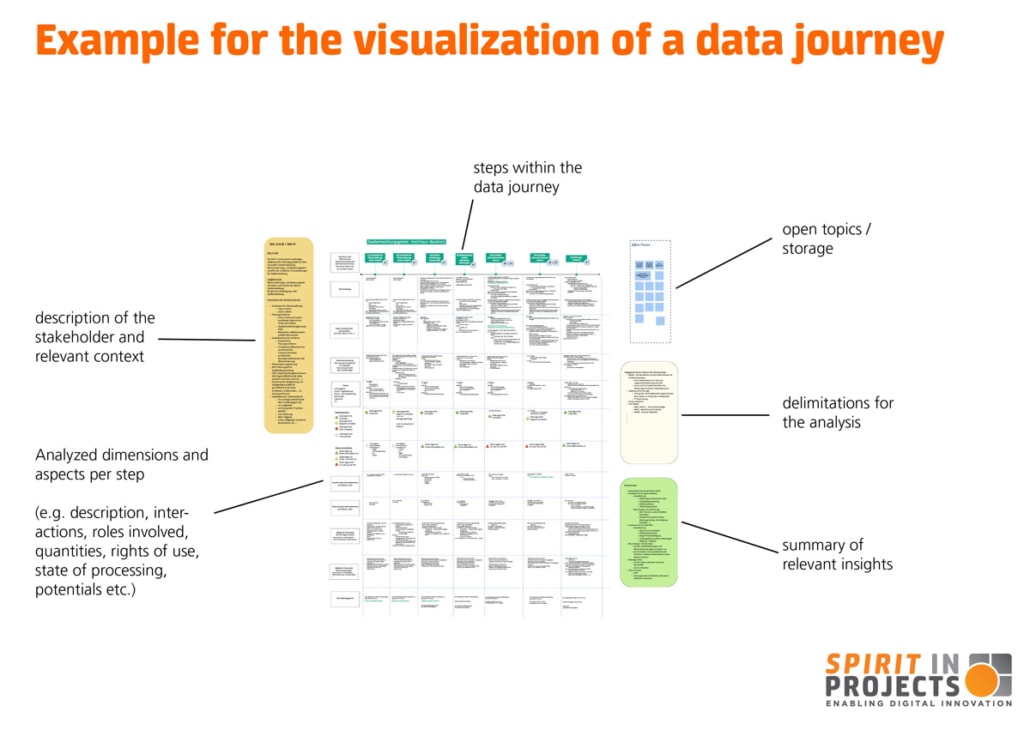Data Journeys: A Path to Better Digitalization for Companies
In today’s digital age, companies are under increasing pressure to digitalize their processes and data in order to stay competitive and meet customer demands. However, the digitalization process can be complex and full of challenges, and companies often find it difficult to embark on that journey effectively. Detailed analyses of business processes require a great deal of time as well as experience in order to effectively and efficiently achieve results in that area.
Spirit in Projects has developed a method here in which we examine the analysis from the standpoint of data touchpoints, since data is the basis for digitalization projects. A “data journey” is thus a trip made on the basis of the data processed in a company. In the process, it doesn’t matter whether the data concerns digital data twins of physical objects or a company’s processes which are entirely data-oriented.
Solution Approach: Data Journey
A data journey is a comprehensive approach for digitalization which uncovers where and how data are produced, collected, saved, analyzed, re-used and interpreted. This is thus implicitly reflected in a company’s value creation process and business processes.
To put it simply, a data journey analyzes the following aspects:
- Data creation: Data are produced through various sources such as users, applications, sensors, social media, transactions, etc.
- Data storage: Data are stored for later use using a variety of methods – in a file-based manner, in databases, data lakes or in the cloud.
- Data processing: Data are produced then processed in order to cleanse and organize the information and convert it into a suitable format. This phase may also include a combination of data from different sources.
- Data analysis: Data are analyzed using a variety of techniques such as statistical analysis, machine learning and visualization in order to uncover patterns, relationships and knowledge.
- Data visualization and communication: The findings and results of the data analysis are shown in some visual format (e.g. diagrams and charts) in order to effectively communicate the information.
- Data-supported decision-making: The findings and results of the data analysis are used as a basis for decisions and actions.
- Data element value creation chain: Data are often enriched over time so that they can be used as data objects in a business context.
Nevertheless, the data journey doesn’t end with the analysis of what is produced and processed and where this happens. On the contrary, it involves finding out where and at what point data become redundant (possibly through different methods of creation, different applications, etc.), where in the process data objects are lacking, what organizational units require access to data objects and what kinds of information requirements they have and what benefits can be derived from the data.
Data Protection as a Core Issue
The legal aspect also plays a role in this process. Are the data being processed personal data? Does the company have rights of use and exploitation? This question often comes up when the data creation process occurs outside of the company (e.g. architectural plans, address lists, statistics, etc.)
Using an analysis and perhaps a visual depiction of the data journey, a company can get started on a targeted optimization of its business processes and digitalization projects and quickly reap benefits for the organization.

The Advantage for Your Company
All in all, a successful data journey can help a company to achieve its business goals faster and more efficiently. It can contribute to improving the quality of products and services, raising customer satisfaction and, when all is said and done, increasing sales.
A data journey also helps companies to set priorities for their digitalization efforts. By considering the various aspects of the journey, a company can determine which parts of the process are most important and can assign resources accordingly. This ensures that the organization makes use of its resources as effectively as possible and that the digitalization process is moved forward as efficiently as possible.
When all is said and done, a data journey helps a company to ensure that its digitalization efforts are in line with its general business strategy. A comprehensive approach to digitalization makes it possible for a company to ensure that the processes and systems it establishes are not only effective, but also correspond to the company’s general objectives.
In conclusion, a data journey can provide a company with a timetable for successful digitalization. A company which implements a data journey concept will be better equipped to cope with the complex road to digitalization and to achieve its goals. The experts at Spirit in Projects are always happy to help you develop a data journey for your company.









